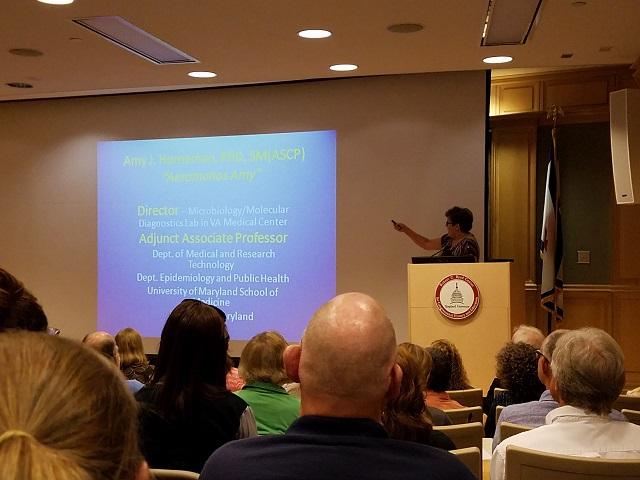(The Picket) – All recreational water can potentially spread disease but steps can be taken to minimize the risk, Dr.Amy Horneman of the Baltimore VA Medical Center, told a forum at Shepherd University.
“If you see someone with a diaper in the water, don’t get in no matter how many covers they have over it…..and if you have anyone over to a pool of your own, never let anyone let a baby with a diaper in,” Horneman said.
In her lecture, “How safe is your recreational water,” Horneman described gruesome bacteria, parasites, and other microbes that can eat brains, muscle, and skin and cause other illnesses. She showed slides with images of human brains that had been destroyed by the rare amoeba Niglaria faleri, a free living protozoan that enters the brain when contaminated water gets into the nose, causing a condition called primary amebic meningoencephalitis (or PAM, for short). PAM is rare, usually occurring further south, but out of over 400 recorded cases, only four people have ever survived, she said.
Even scarier were the photos of people infected with the bacteria Vibrio vulnificus from eating underprepared seafood. Their flesh was eaten from the inside out (necrotizing fasciitis) in a matter of hours, dying as little as 12 hours after exposure. V. vulnificus is especially concerning to people vacationing at the beach, as it thrives in salt water and can infect people through open wounds and ingestion.
Many of the microbes she described live in local waters, she said. Horneman’s talk covered microbes including algae, amoebas, aeromonads, vibrioads, and the parasite Cryptosporidium. She was quick to remind people that not all species in the groups she talked about posed a serious risk to people.
Out of all the microbes she talked about, the one most likely to infect people in local recreational water was cryptosporidium, a parasitic protozoa that is spread through fecal matter and causes severe watery diarrhea. A common place people get infected with cryptosporidium is public pools, especially when there are young children in diapers in the water.
Most waterborne illnesses are much more of serious threat to people with compromised immune systems, she said. The very young, the elderly, and those with HIV/AIDS are at the most risk of infection. Most of the microbes Horneman mentioned thrived best in warm weather, and she suggested that the uptick in cases around the world might be attributable to a combination of climate change and an increasing ability to recognize these pathogens.
Horneman, also known as Aeromonas Amy after the genus of bacteria she is best known for studying, brought decades of experience and a touch of humor to the relaxed lecture in the Byrd Center for Legislative Studies on Aug. 30.
She has become the global authority on bacteria in the Aeromonas genus over her career and has discovered new species, including two she scraped from under a dock in Baltimore’s inner harbor one winter as a friend kept her from falling into the icy water.
Horneman has an extensive collection of Aeromonas species from all over the world stored in a freezer in her Baltimore lab. Most species of Aeromonas aren’t harmful to humans, but those that are, such as Aeromanas hydrophilia can cause symptoms ranging from gastroenteritis (an acute diarrhea) to necrotizing fasciitis (mass tissue death, like in V. vulnificus).
Horneman rounded out her lecture with suggestions people could use to reduce their risk of infection. Keeping your head above water or using nose plugs can prevent infection from N. faleri, as it can’t infect humans through ingestion, and only eating well cooked seafood will minimize exposure to foodborne pathogens like V. vulnificus.
Staying out of potentially contaminated water (which includes any natural or shared water source, even if it’s treated) is one of the easiest and most effective ways to prevent a wide range of infections, and a PUR water filter is good for keeping parasite Cryptosporidium out of drinking water, which can survive chlorination, she said.
By far the biggest and most important step to prevent any sort of infection is hand washing, Horneman said.
The lecture was the first in a series of scientific lectures hosted by Shepherd President Dr. Mary Hendrix.
Demian Nunez is the Managing Editor for The Picket. He can be reached at dnunez01@rams.shepherd.edu

